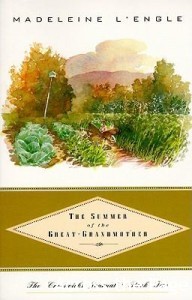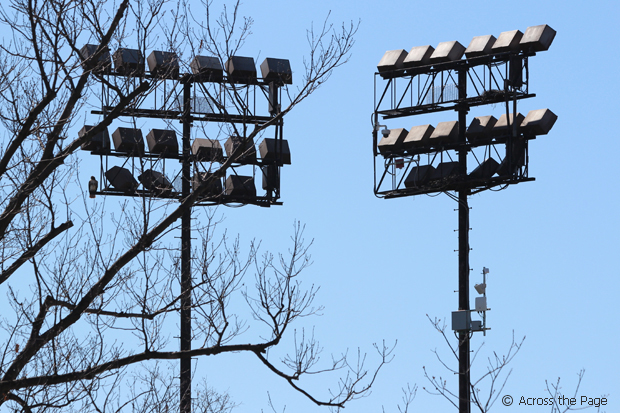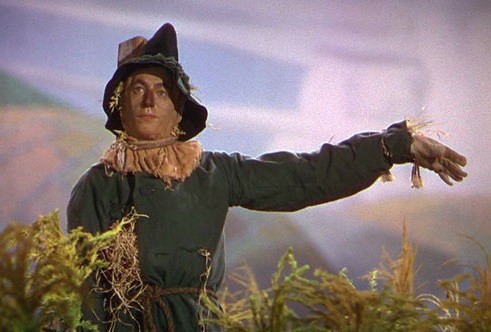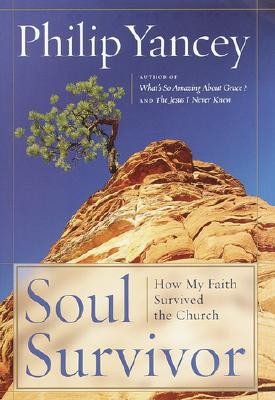The Summer of the Great Grandmother
 Summer of the Great Grandmother tells the story of Madeleine L’Engle’s last summer with her mother. It’s the second of L’Engle’s four “Crosswicks Journals,” but since I read them out of order it was the last one that remained for me.
Summer of the Great Grandmother tells the story of Madeleine L’Engle’s last summer with her mother. It’s the second of L’Engle’s four “Crosswicks Journals,” but since I read them out of order it was the last one that remained for me.
L’Engle is usually classed as a Christian writer, but she is the type of Christian who is often questioning and struggling and acknowledging the mysteries. She’s not someone I read to be instructed, especially. She’s the kind of author who comes alongside and affirms the real experience of living with its griefs and joys and its refusal, in the midst of it, to resolve into a neat inspirational narrative.
Her mother, in this story, has ceased to remember most of who she is. She is more child than mother, and she comes to spend the summer as usual with L’Engle’s family at their 200-year-old Connecticut farmhouse, Crosswicks. Despite having a houseful of helpful, loving people, it’s a difficult summer that finds L’Engle filling her journal with questions and conflicting emotions. She feels strongly that it’s important for her mother to be among family rather than at a nursing home, and one of her recurring struggles is with a society in which more and more of the elderly suffer from dimentia, yet there is less and less of a humane culture to support or value them. “Obviously, nursing homes have not caused senility in the elderly,” she writes,
but when grandmother or great grandmother continued to live with the larger family, to be given meaning because she could at least stir the soup or rock the baby, the climate for growing old and dying was more healthy than it is today. I cannot reproduce that climate for Mother… All I can do is try not to isolate her; is to hold her when she is afraid; is to accept her as she is, as part of this family, without whom we would be less complete.
She spends a lot of time remembering, trying to get at who her mother really was. There is plenty of delving into the deep past of her family’s history, some of which interested me and some of which didn’t. It did make me realize how little I know of my own family’s past. And it provides an opportunity to think in a sustained way about some of the issues many of us are bound to face as parents age.
While reading, I got curious. What had happened to L’Engle since the accounts in the Crosswicks Journals? My brief tour of the internet made me a little sad. When she died in 2007, this woman so passionate about keeping her own mother out of a nursing home was living in one. Her husband, as I already knew from Two-Part Invention, had died of cancer. Her son had died at age 47 for reasons not spelled out anywhere very clearly. Her daughter and husband had divorced.
I’m not sure how to make sense of the contrast between these facts and the impression I had of a rather idealized family life in all four Crosswicks Journals. All I know is that L’Engle herself affirmed over and over that the most difficult experience takes place within a sphere of purposeful, loving divine activity. Nothing within or beyond her own published record prompted her to revise this view.





9 Comments
GretchenJoanna
People keep recommending L’Engle’s Crosswicks Journals to me, and I think I’m ready to try them. That you appreciate them encourages me in that direction.
I have been having increased involvement with three elderly people including my father-in-law, all with very different situations but of course the same basic human needs. I often feel pretty helpless to facilitate those needs being met — other than by my presence as a friend, which is a finite resource!
DebD
I have not read this particular Crosswick’s Journal so perhaps I shouldn’t speak about the disparity between what she was able to give to her mother and what she was able to receive from her family. All I can say that every situation (and relationship) is different. Our family is facing the real possibility that my mom may need to enter a nursing facility. She is not that old so it’s quite possible that this will be a longtime need too. Private care is expensive and it’s getting unhealthy for my sis and father to care for her themselves. And, this is just the physical issues…. I won’t even touch on the personalities as play in all this. We’re hoping that social services will help so she can stay home longer, but from everything I hear, it’s not a sure thing.
thanks for your review. I should like to read this one, but I think I’ll wait until it’s isn’t hitting so close to home. Besides, I’ve had “A Two-Part Invention” on my bookshelf for a few years waiting patiently for me to retrieve it.
Janet
GretchenJoanna, it sounds like this might be a very timely read for you right now.
Deb, L’Engle says many times in the book that decisions will need to be made at the end of the summer, but because of the way things unfold it doesn’t come to that. I can appreciate the position your family is in!
I really enjoyed Two-Part Invention. I think that one, and The Irrational Season, were my favorites of the Crosswicks books.
Carrie, Reading to Know
I like the way you describe L’Engle’s faith and classification as a writer. I read the first book in this series at the urging of Jennifer @ 5 Minutes for Books. Thank goodness for blogs because I don’t really remember my EXACT thoughts. I vaguely recall not being drawn to L’Engle and mostly thinking that apparently I’m the only reader on earth who doesn’t “get” her. It’s not that I dislike her and I agree with what you say about her offering real life experiences. I apparently just don’t connect in the way that — almost everyone else I know does!
Janet
I think timing is a big part of it too. It always amazes me that I can read an author and be completely unmoved at one time of life, then “discover” them later on when the circumstances are right.
Alice@Supratentorial
I think I need to try these again. I have never been a huge L’Engle fan but always felt like I might be one day, if that makes sense. I guess I’m waiting for that right timing.
Barbara H.
I haven’t read L’Engle since A Wrinkle in Time back when I was a child, and I don’t remember much about that. It’s one of many books I want to reread. I had read in some places that she was a Christian writer, in other places that she was “New Age.” and I had no idea which to believe.
How to care for an aging parent is such a huge decision with so many factors. My mother-in-law has been in three different assisted living places now. She had to leave one of them when we moved to another state and the other when the level of care she needed was beyond what they offered. None of them is perfect, none cared for her exactly the way we would like, all of them had oversights. It hasn’t been terrible, but it just hasn’t been all it could and should be. Many times we’ve discussed how we wish we could have her here, but every time we discuss it we don’t see how we can. She needs two people to help her with things like going to the bathroom, and I’d be here alone with her much of the day. Hiring in-home care during the day for just five days a week M-F costs as much as the assisted living place. And then there would be issues like having a stranger in your home, what happens when we need to travel, etc. I was feeling guilty comparing our situation to a friend who cared for her m-i-l with Alzheimer’s in her home for years until I remembered she home schooled and had several older children at home to help.
It’s been eye-opening to have her near us, and though I’ve always said I wanted to live to be 100, I may have to amend that some day. One birthday card I saw said “Getting old is not for sissies,” and I agree! But I have to trust that God will provide the grace to get through everything connected with getting older just as He has all along the way.
Carrie Groves
I would not exactly say that I enjoyed this article, but I think having read it was a good thing. It answers the question what happened to Bion and reveals a lot about L’Engle’s family and work. I don’t think it was a journalistic hit piece. As much as I loved her, especially growing up, the revelations ring all too true. The article reminds me that true Christianity cannot be practiced like Buddhism, as a philosophy or way of life. Christ is all, and all in all.
I’m almost sorry to give you the link! But it certainly tells more of the story, and the reminder that beautiful ideas and practices are not THE thing is certainly always good one. Still. Ugh.
http://www.newyorker.com/archive/2004/04/12/040412fa_fact_zarin
Janet
Thanks for the link. Some of this information I was already aware of, and some I wasn’t. I take accounts like this with a grain of salt. This one contains some misrepresentations even of L’Engle’s published accounts, so I’m not ready to grant it much credibility in its interpretation of things I am less informed about. Most likely the truth is somewhere between L’Engle’s autobiographical interpretation of her life and family (and autobiography is always a slippery thing), and this author’s impressions.
I’m not comfortable evaluating L’Engle’s faith, but as I say in this review, she’s not someone I consider a mentor spiritually. I have never really trusted her in that sense. She is a questioner, and her writing has helped me at times to formulate questions and ways of seeing things. But pointing to answers? Not so much.
I do think there are tragic aspects to her life, and her family’s life. Sad.